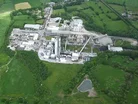Governments beginning to move on Carbon Capture Projects

The UK government has announced a substantial investment in carbon capture technology, which may have significant implications for the construction industry. Chancellor Rachel Reeves revealed £21.7 billion in funding over 25 years for carbon capture projects, focusing on two approved carbon capture sites in Teesside and Merseyside.
This investment aims to create 4,000 new jobs and attract £8 billion in private investment. Such developments could offer opportunities for construction firms involved in infrastructure development and industrial facilities.
It will also contain infrastructure to capture, transport and store carbon dioxide emissions from industry.
This will be created through upgrading existing infrastructure and developing new infrastructure including underground pipelines, hydrogen production plants and storage facilities.
HyNet contains five projects:
- Hanson Padeswood Cement Works Carbon Capture and Storage Project
- Viridor Runcorn Industrial CCS
- Protos Energy Recovery Facility
- Buxton Lime Net Zero
- HyNet Hydrogen Production Plant 1 (HPP1)
The Padeswood cement works in North Wales is owned by Heidelberg Materials.
Carbon Capture, Usage and Storage (CCUS) is a process that captures carbon dioxide emissions from sources such as power plants and industrial facilities. The captured CO2 is then transported to a storage site where it is deposited underground. This technology is considered essential for reducing greenhouse gas emissions and addressing climate change.
The new carbon capture and CCUS-enabled hydrogen projects aim to remove over 8.5 million tonnes of carbon emissions annually. This ambitious target could lead to increased demand for specialized construction services and expertise in carbon capture technology.
Government Commitment to Carbon Capture
Chancellor Reeves emphasizes the importance of this announcement, stating that the UK has enough capacity to store 200 years' worth of emissions. She notes that CCUS is a revolutionary method for tackling the climate crisis while helping industry decarbonise.
This commitment to carbon capture technology could create new opportunities for construction companies specializing in industrial and energy infrastructure. The government's investment may position firms with expertise in this area to benefit significantly.
The Carbon Capture and Storage Association (CCSA), which represents the carbon capture industry, has highlighted the strides made towards deploying carbon capture projects. The establishment of the first two CCUS clusters in the North West and North East of England signals potential job creation in the sector.
Impact on the Construction Industry
For construction professionals, this investment could translate into a range of new projects. These may include building carbon capture facilities, upgrading existing industrial sites, and developing infrastructure for carbon transport and storage.
The funding announcement has been welcomed by industry stakeholders who see it as a commitment from the UK government to support the burgeoning carbon capture and storage sector. This influx of investment could lead to increased demand for construction services across various sectors, including energy, manufacturing, and waste management.
Regional Focus and Economic Benefits
The regional focus of these projects is particularly noteworthy for construction firms operating in the North West and North East of England. The emphasis on these areas suggests a confidence in local industries and potential growth opportunities.
This regional emphasis could lead to a concentration of construction activity, creating new opportunities for local firms and workers. The commitment to developing CCUS clusters may stimulate economic growth in these regions.
Green Jobs and Skills Development
The investment in carbon capture technology is expected to generate numerous green jobs, which could include roles in construction and related fields. Industry leaders have noted that continued investment will be crucial for creating thousands of green jobs across various sectors.
For the construction industry, this could mean an increased demand for workers with specialized skills in sustainable building practices and carbon capture technology. Construction firms may need to invest in training and development to meet these new requirements.
Long-term Implications for the Construction Sector
As the UK moves towards its net-zero emissions target, the construction industry will play a crucial role in developing necessary infrastructure. Projects integral to decarbonising energy from waste production will require significant construction efforts.
For construction professionals, this signals a shift towards more sustainable practices and an adaptation to new technologies and building methods. Companies that can demonstrate expertise in low-carbon construction and carbon capture infrastructure may find themselves at a competitive advantage as these initiatives progress.




